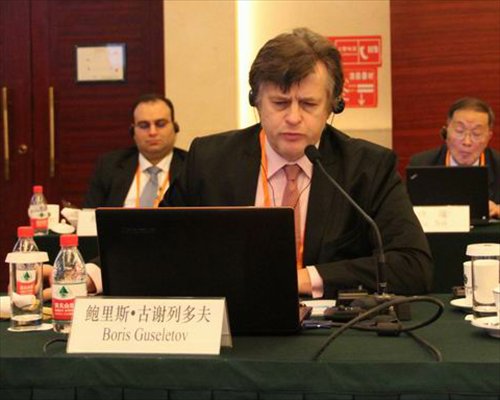Decisiveness critical in Russia’s tumult

Boris Guseletov
Editor's Note:
The sluggish Russian economy continues to dominate headlines in the New Year. Is Russia prepared for lengthy confrontation with the West? What measures will Russian President Vladimir Putin take? The Global Times reporter Wang Wenwen (GT) talked to Boris Guseletov (Guseletov), advisor of the State Duma member, on these issues.
GT: Russian President Putin now faces a full-blown ruble crisis within the country. What economic impact will the crisis bring to Russia?
Guseletov: Depreciation of the Russian currency has already had dire consequences for the Russian economy, as it leads to lower purchasing power and higher prices for leading products such as food, clothing and footwear.
There is one positive takeaway; Russian goods may be priced more competitively and so gain an advantage over their foreign competitors. But in addition to the fall of the ruble, the negative impact on the Russian economy has stemmed from falling crude oil prices and Western economic sanctions, particularly financial ones, which deprive Russian banks and enterprises of cheap long-term money and impose a ban on the sale of high-tech equipment to Russia, especially affecting oil and gas production and development of new fields.
GT: Will the weakening ruble shake Putin's grip on power? How loyal are the Russian people to their government?
Guseletov: So far, Putin's rating is quite high due to the growth of patriotic sentiment in connection with the integration of the Crimea into Russia and the conflict with the West over Ukraine. But rising prices, unemployment and the deterioration of the overall socioeconomic situation in the country may see his rating decreasing.
It depends on reaction of the authorities to the deteriorating situation in the country. If the government is late with the decision-making, as it was recently over the ruble's devaluation, this may cost Putin and the government.
GT: What will Putin do? Will he take risky foreign policy to distract domestic attention?
Guseletov: Putin has already announced a series of measures to stabilize the ruble and the general economic situation. The Central Bank has raised the refinancing rate, but how long this will last is not yet clear. The government has allocated money for banks and a number of leading companies who need to tackle their huge debts. And it has reduced the foreign exchange reserves of the country.
The authorities also intend to support Russian producers, especially in agriculture and production of consumer goods. But their ascent will take time, perhaps as long as several years.
With regard to foreign policy, Putin mostly sharply criticized the West, especially the US, and said that Russia will shift to the East, as evidenced by his visits to China, India and Turkey. This is all aimed at diverting the Russian public consciousness from internal problems, but such a measure is unlikely to work for long.
GT: Will the ruble crisis bring hope to the deadlock of the Ukraine crisis, as the West expects? Will Russia make any compromise with the West?
Guseletov: The rhetoric that the Russian authorities were using against Ukraine clearly softened, but it is unlikely Putin will meet all the conditions of the West in this matter, especially over Crimea.
GT: How will the ruble crisis change regional geopolitics?
Guseletov: The crisis worsened Russian relations with its main partners such as Belarus and Kazakhstan. Belarus used the crisis in Russia to earn money for the re-export of products from western Europe, so Russia was forced to restrict the export of Belarusian products on its territory, making Minsk unhappy. Kazakhstan's leadership is also concerned with the situation in Ukraine and fears that it could spill over into its territory. All this has a negative impact on the prospects of the proposed Eurasian Economic Community.